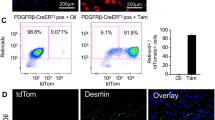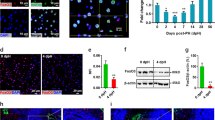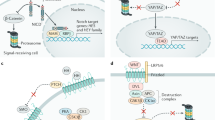Abstract
Several growth factors have been suggested to play a crucial role in liver regeneration, but a functional proof is still missing. Since fibroblast growth factors are important for the initiation of mammalian liver development, we determined the roles of these mitogens in liver repair by targeted expression of a dominant-negative fibroblast growth factor receptor (FGFR) in hepatocytes of transgenic mice. The liver of young animals appeared histologically normal, and liver function was not obviously impaired. In aged transgenic mice, the frequency of fatty liver development was strongly increased compared to control animals. Following partial hepatectomy, transgenic mice showed markedly reduced hepatocyte proliferation because of an arrest in the late G1 phase of the cell cycle. These data demonstrate a key role of FGFR signalling in repair after liver injury.
This is a preview of subscription content, access via your institution
Access options
Subscribe to this journal
Receive 50 print issues and online access
$259.00 per year
only $5.18 per issue
Buy this article
- Purchase on Springer Link
- Instant access to full article PDF
Prices may be subject to local taxes which are calculated during checkout




Similar content being viewed by others
References
Arora V, Knapp DC, Smith BL, Statdfield ML, Stein DA, Reddy MT, Weller DD and Iversen PL . (2000). Pharmacol. Exp. Ther., 292, 921–928.
Behrens A, Sibilia M. David JP, Mohle-Steinlein U, Tronche F, Schutz G and Wagner EF . (2002). EMBO J., 21, 1782–1790.
Cressman DE, Greenbaum LE, DeAngelis RA, Ciliberto G, Furth EE, Poli V and Taub R . (1996). Science, 274, 1379–1383.
de Moerlooze L, Spencer-Dene B, Revest J, Hajihosseini M, Rosewell I and Dickson C . (2000). Development, 127, 483–492.
Fausto N . (2000). J. Hepatol., 32, 19–31.
Housley RM, Morris CF, Boyle W, Ring B, Biltz R, Tarpley JE, Aukerman SL, Devine PL, Whitehead RH and Pierce GF . (1994). J. Clin. Invest., 94, 1764–1777.
Hu Z, Evarts RP, Fujio K, Marsden ER and Thorgeirsson SS . (1995). Cell Growth Differ., 6, 1019–1025.
Johnson DE and Williams LT . (1993). Adv. Cancer Res., 60, 1–41.
Jung J, Zheng M, Goldfarb M and Zaret KS . (1999). Science, 284, 1998–2003.
Kan M, Wu X, Wang F and McKeehan WL . (1999). J. Biol. Chem., 274, 15947–15952.
Korhonen J, Partanen J and Alitalo K . (1992). Int. J. Dev. Biol., 36, 323–329.
Loyer P, Ilyin G, Cariou S, Glaise D, Corlu A and Guguen-Guillouzo C . (1996). Prog Cell Cycle Res. 2, 37–47.
Lüdde T, Kubicka S, Plumpe J, Liedtke C, Manns MP and Trautwein C . (2001). Oncogene, 20, 5264–5278.
Marsden ER, Hu Z, Fujio K, Nakatsukasa H, Thorgeirsson SS and Evarts RP . (1992). Lab. Invest., 67, 427–433.
Nonogaki K, Pan XM, Moser AH, Staprans I, Feingold KR and Grunfeld C . (1995). Endocrinology, 136, 4278–4284.
Ornitz DM and Itoh N . (2001). Genome. Biol., 2, 3005 (reviews).
Peters K, Werner S, Liao X, Wert S, Whitsett J and Williams L . (1994). EMBO J., 13, 3296–3301.
Senaldi G, Shaklee CL, Simon B, Rowan CG, Lacey DL and Hartung T . (1998). Hepatology, 27, 1584–1591.
Strain AJ, McGuinness G, Rubin JS and Aaronson SA . (1994). Exp. Cell Res., 210, 253–259.
Suzuki M, Itoh T, Osada H, Rubin JS, Aaronson SA, Suzuki T, Koga N, Saito T and Mitsui Y . (1993). FEBS Lett., 328, 17–20.
Sweetser DA, Birkenmeier EH, Hoppe PC, McKeel DW and Gordon JI . (1988). Genes Dev., 2, 1318–1332.
Trautwein C, Rakemann T, Malek NP, Plumpe J, Tiegs G and Manns MP . (1998). J. Clin. Invest., 101, 1960–1969.
Ueno H, Gunn M, Dell K, Tseng Jr A and Williams LT . (1992). J. Biol. Chem., 267, 1470–1476.
Werner S, Smola H, Liao X, Longaker MT, Krieg T, Hofschneider PH and Williams LT . (1994). Science, 266, 819–822.
Werner S, Weinberg W, Liao X, Peters KG, Blessing M, Yuspa SH, Weiner RL and Williams LT . (1993). EMBO J., 12, 2635–2643.
Yamada Y, Webber EM, Kirillova I, Peschon JJ and Fausto N . (1997). Proc. Natl. Acad. Sci. USA, 94, 1441–1446.
Yu C, Wang F, Kan M, Jin C, Jones RB, Weinstein M, Deng CX and McKeehan WL . (2000). J. Biol. Chem., 275, 15482–15489.
Acknowledgements
We thank Dr P Möller, Ulm, Germany and Dr R Wanke, Munich, Germany, for help and advice with the liver histology, and Dr Clive Dickson, London, UK, for critically reading the manuscript. This work was supported by grants from the Human Frontier Science Program (to SW), the Swiss National Science Foundation (Grant No. 31-61358.00 to SW) and the Deutsche Forschungsgemeinschaft (SFB 566, project B8 to CT).
Author information
Authors and Affiliations
Corresponding author
Rights and permissions
About this article
Cite this article
Steiling, H., Wüstefeld, T., Bugnon, P. et al. Fibroblast growth factor receptor signalling is crucial for liver homeostasis and regeneration. Oncogene 22, 4380–4388 (2003). https://doi.org/10.1038/sj.onc.1206499
Received:
Accepted:
Published:
Issue Date:
DOI: https://doi.org/10.1038/sj.onc.1206499
Keywords
This article is cited by
-
Liver organoid culture methods
Cell & Bioscience (2023)
-
Optimizing Patient Pathways in Advanced Biliary Tract Cancers: Recent Advances and a French Perspective
Targeted Oncology (2023)
-
Biomaterial-based cell delivery strategies to promote liver regeneration
Biomaterials Research (2021)
-
Markers of liver regeneration—the role of growth factors and cytokines: a systematic review
BMC Surgery (2020)
-
Buffalo liver transcriptome analysis suggests immune tolerance as its key adaptive mechanism during early postpartum negative energy balance
Functional & Integrative Genomics (2019)



